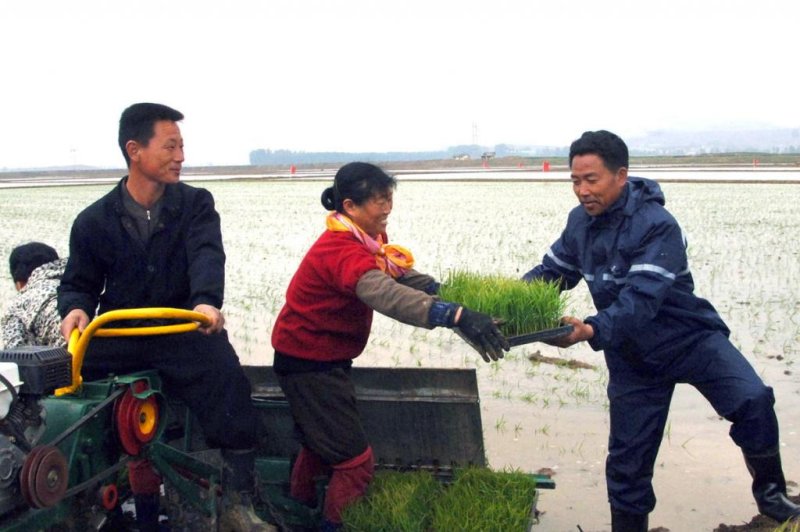North Korean farmers transfer rice seedlings in Chongsan-li. Seoul’s Unification Ministry said if a water shortage in North Korea persists until July 5, potato and rice yields are expected to decrease rapidly, and corn production is also likely to be affected. Photo by KCNA/Yonhap
SEOUL, June 9 (UPI) -- North Korea's crop production could fall by as much as 20 percent in July if a drought persists in the isolated country, South Korea's Unification Ministry said Tuesday.
Seoul's forecast included estimates for North Korea food production in June, which was down 5 to 10 percent from last year, Yonhap reported. Many North Korean farms have switched from planting rice to corn as water has become increasingly scarce in the country and North Korean authorities are ordering similar substitutions be made.
In May, Curtis Melvin of the U.S.-Korea Institute at Johns Hopkins University said North Korea is experiencing its worst drought in years, and the water shortage is plaguing over a hundred lakes and reservoirs.
North Korea has declared the drought the worst and called on North Korean civilians and military personnel to act.
Seoul's Unification Ministry said that if a water shortage in North Korea persists until July 5, potato and rice yields are expected to decrease rapidly, and corn production is also likely to be affected.
In 2014, precipitation across North Korea reached only 61 percent of the average rainfall between 1981 and 2010. In May, rainfall was even lower, reaching only 56.7 percent of that historical average.
Seoul said North Korea was able to overcome a drought last year by using water from dams and reservoirs, but the drought has threatened the reserves. Hamheung Dam was down 12 inches from last year.
North Korea's total food production in 2015 is also expected to be down to 3.84 million tons, or 20 percent, a significant decrease from 4.8 million tons in 2014.
That level, the Unification Ministry said in a report, is the lowest since the end of the Great Famine that killed millions in North Korea, according to a U.N. report.
In April, South Korea approved the delivery of 15 tons of fertilizer and farming equipment to North Korea for the first time in five years. Seoul, however, has refused to supply food aid unless Pyongyang agrees to resume bilateral talks.
The U.N. has stated 70 percent of North Koreans are food insecure.















